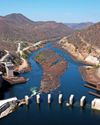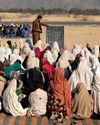
Azerbaijan has been built on oil and fossil fuels make up 90% of its exports. There could be no starker reminder of the core question world leaders have come to Baku to decide: whether the planet will burn so fossil fuel producers can continue to make money, or whether to take a different path.
That the world's biggest economy, the US, is about to shift away from the focus on clean energy fostered by Joe Biden towards the "drill, baby, drill" policies of Donald Trump will be a main topic of conversation for the tens of thousands of delegates at the Cop29 UN climate summit. However, many will point out that no country has ever produced as much oil and gas as the US does now, with 20% more oil and gas licences issued during the Biden administration than during Trump's first term.
Climate leaders reacted defiantly to the US election outcome. "The result from this election will be seen as a major blow to global climate action but it cannot and will not halt the changes under way to decarbonise the economy and meet the goals of the Paris agreement," declared Christiana Figueres, the former UN climate chief who is a co-founder of the Global Optimism thinktank.
Trump will not be at Cop29, a fortnight-long meeting that is the latest in a series stretching back to 1992 when the UN framework convention on climate change the parent treaty to the 2015 Paris climate agreement - was signed.
Those talks may appear to have achieved little, as greenhouse gas emissions are still rising and the losses from extreme weather are becoming daily more apparent. Last year was the hottest on record and this year is likely to be hotter still.
This story is from the {{IssueName}} edition of {{MagazineName}}.
Start your 7-day Magzter GOLD free trial to access thousands of curated premium stories, and 9,000+ magazines and newspapers.
Already a subscriber ? Sign In
This story is from the {{IssueName}} edition of {{MagazineName}}.
Start your 7-day Magzter GOLD free trial to access thousands of curated premium stories, and 9,000+ magazines and newspapers.
Already a subscriber? Sign In

Friendship interrupted
They were best mates. Then one had a baby, while the other struggled to conceive. They share their brutally honest takes on what happens when motherhood affects friendship

KERNELS OF HOPE
During the siege of Leningrad, botanists in charge of an irreplaceable seed collection, the first of its kind, had to protect it from fire, rodents-and hunger

A new horizon' The inverse link between cancer and dementia
Scientists have long been aware of a curious connection between these common and feared diseases. At last, a clearer picture is emerging

Across the universe
Samantha Harvey won the Booker prize with a novel set in space. Yet, she says, Orbital is actually 'a celebration of Earth's beauty with a pang of loss'

Frank Auerbach 1931 -2024
Saved from the Holocaust, this artist captured the devastation of postwar Britain as ifits wounds were his own but he ultimately found salvation in painting

Seven lessons I've learned after 28 years as economics editor
Margaret Thatcher was Britain's prime minister and Neil Kinnock was leader of the Labour party.

Droughtstricken dam leaves economies powerless
A ll is not well with the waters of Lake Kariba, the world's human-made lake largest A punishing drought has drained the huge reservoir close to record lows, raising the prospect that the Kariba Dam, which powers the economies of Zambia and Zimbabwe, may have to shut down for the first time in its 65-year history.

Let this be the end of these excruciating celebrity endorsements
I wish celebrities would learn the art of the French exit. But they can't, which is why Eva Longoria has announced she no longer lives in America. \"I get to escape and go somewhere,\" she explained.

Alive, but unable to thrive under absolute patriarchy
Since the Taliban returned to power, women and girls have tried defiance, but despair at their harshly restricted lives

‘It's tragic’ Reflection in the wake of Amsterdam violence
Carrying signs scrawled with messages urging unity, they laid white roses at the statue of Anne Frank, steps away from the home where her family had hidden from Nazi persecution.